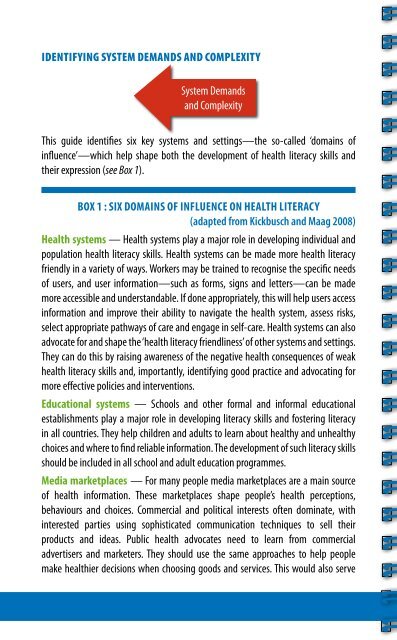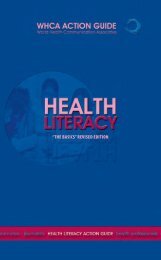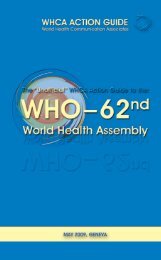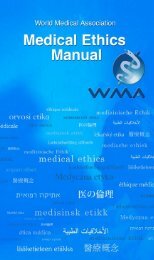Part 1 'the basics' - World Health Communication Associates
Part 1 'the basics' - World Health Communication Associates
Part 1 'the basics' - World Health Communication Associates
Create successful ePaper yourself
Turn your PDF publications into a flip-book with our unique Google optimized e-Paper software.
10<br />
identifying system demands and comPlexity<br />
System Demands<br />
and Complexity<br />
This guide identifies six key systems and settings—the so-called ‘domains of<br />
influence’—which help shape both the development of health literacy skills and<br />
their expression (see Box 1).<br />
Box 1 : Six DomAinS of infLuence on HeALtH LiterAcy<br />
(adapted from Kickbusch and Maag 2008)<br />
<strong>Health</strong> systems — <strong>Health</strong> systems play a major role in developing individual and<br />
population health literacy skills. <strong>Health</strong> systems can be made more health literacy<br />
friendly in a variety of ways. Workers may be trained to recognise the specific needs<br />
of users, and user information—such as forms, signs and letters—can be made<br />
more accessible and understandable. If done appropriately, this will help users access<br />
information and improve their ability to navigate the health system, assess risks,<br />
select appropriate pathways of care and engage in self-care. <strong>Health</strong> systems can also<br />
advocate for and shape the ‘health literacy friendliness’ of other systems and settings.<br />
They can do this by raising awareness of the negative health consequences of weak<br />
health literacy skills and, importantly, identifying good practice and advocating for<br />
more effective policies and interventions.<br />
educational systems — Schools and other formal and informal educational<br />
establishments play a major role in developing literacy skills and fostering literacy<br />
in all countries. They help children and adults to learn about healthy and unhealthy<br />
choices and where to find reliable information. The development of such literacy skills<br />
should be included in all school and adult education programmes.<br />
media marketplaces — For many people media marketplaces are a main source<br />
of health information. These marketplaces shape people’s health perceptions,<br />
behaviours and choices. Commercial and political interests often dominate, with<br />
interested parties using sophisticated communication techniques to sell their<br />
products and ideas. Public health advocates need to learn from commercial<br />
advertisers and marketers. They should use the same approaches to help people<br />
make healthier decisions when choosing goods and services. This would also serve<br />
Section 1: wHat iS HealtH literacy?






